|
The Green / (High Street ) )
Westerham
01959 562926
https://whatpub.com/grasshopper-on-the-green
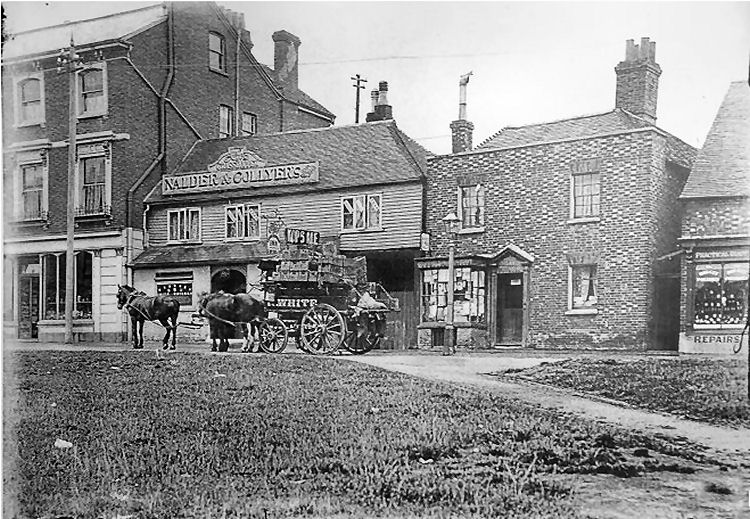
Above photo 1902. |
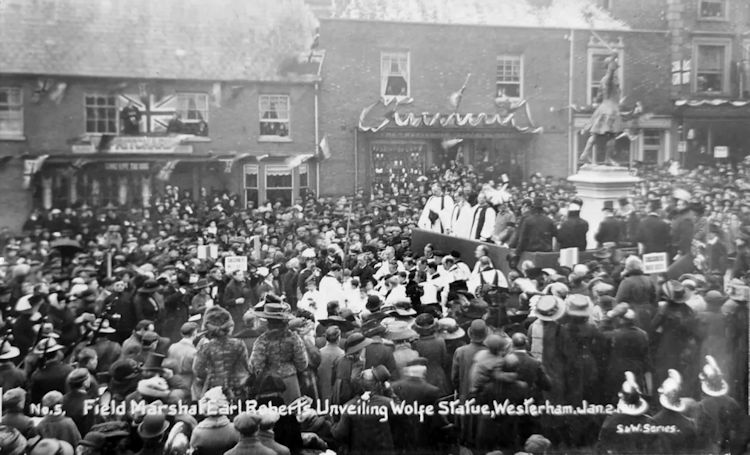
Above postcard Monday 2nd January 1911, kindly sent by Rory Kehoe.
This photograph was taken from the pub, rather than taken of it.
Commemorating Westerham's most famous son, General James Wolfe, with a
statue, was clearly going to need a significant VIP to unveil it. In
1911, they didn't come much bigger than Field Marshal Lord Frederick
"Bobs" Roberts, who had been the doyen of the British Army for many
years. |
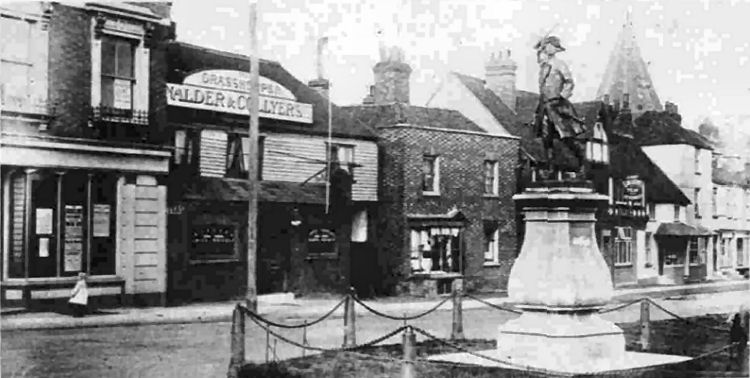
Above photo, 1927 also showing the statue of General James Wolfe, the
conqueror of Canada. |
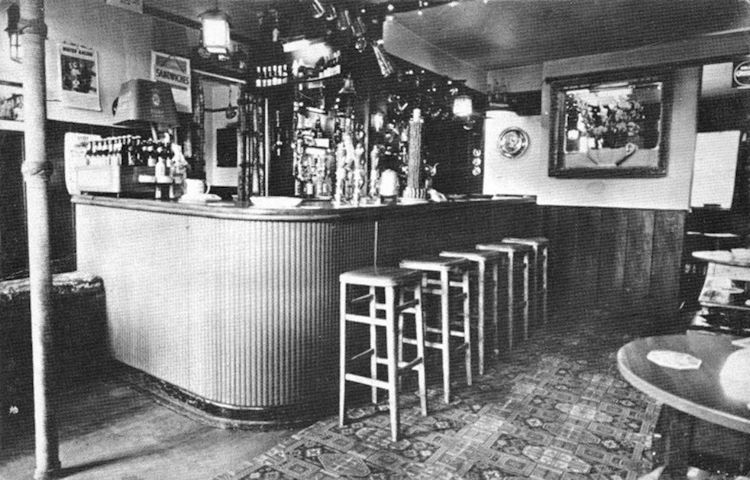
Above photo, circa 1953, kindly sent by Rory Kehoe. Nice shot of the
inside of the pub, which appears to have still been gas lit. On the bar
is a penny tower, which was a popular way to raise money for local good
causes. Also on the bar, far left, is the 1950s' cutting edge bottled
beer cooler. Some of these coolers were mains-operated/refrigerated,
whilst others were simply shallow tubs, filled with water and then
topped-up with ice. |
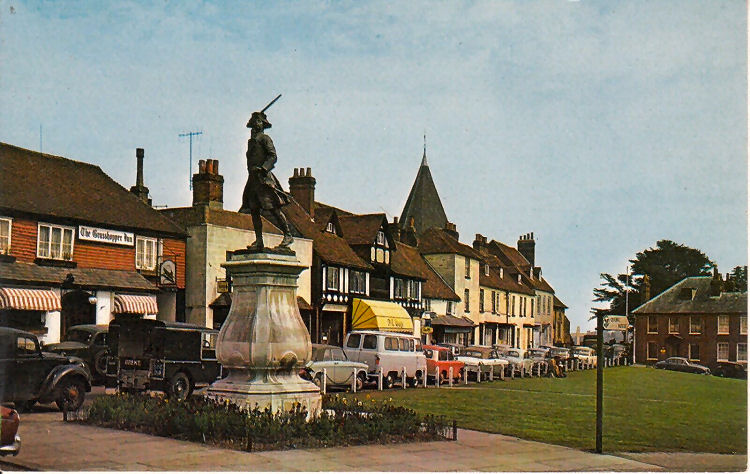
Above postcard, circa 1965, kindly sent by Rory Kehoe. |
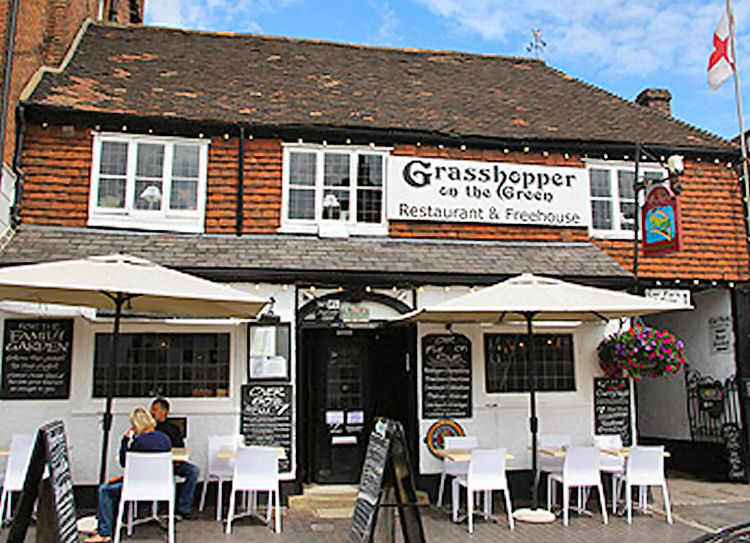
Above photo 2012. |
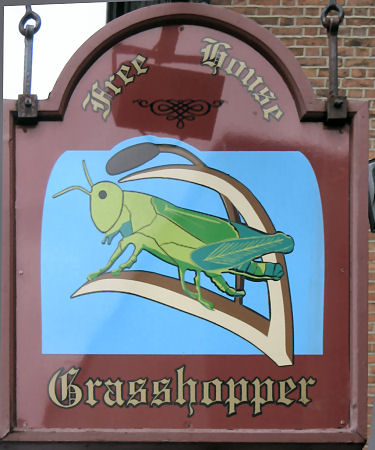
Above sign July 2012.
|
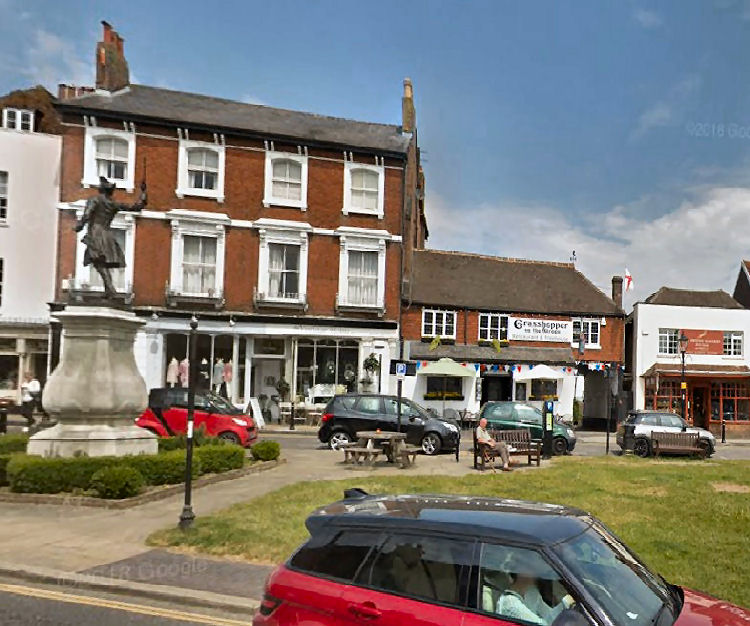
Above Google image 2016. |
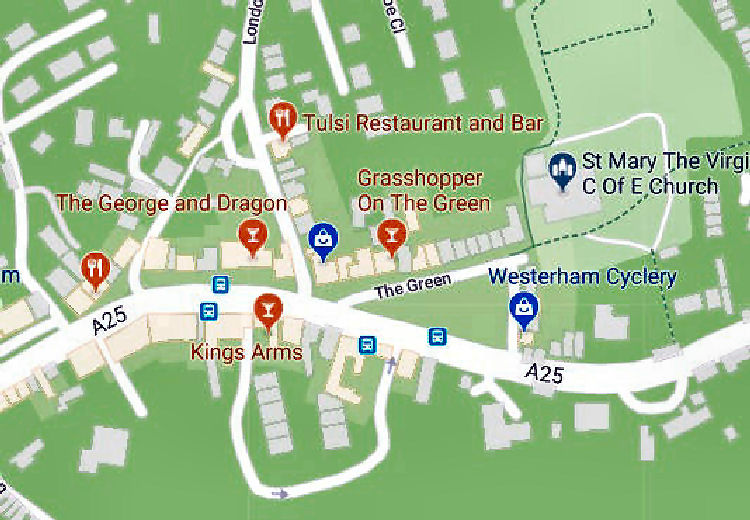
Above map 2018. |
|
Southeastern Gazette, 5 July 1853.
Mary Welch, 43, for stealing a table-cloth, the property of Stephen
Burbary, at Westerham.
The prosecutor is landlord of the "Grassshopper" public-house and
the cloth was used in his tap-room on the 5th May, on which day the
prisoner was at his house. On the 6th the prisoner offered the cloth
for sale at the "White Horse," Edenbridge, for 4d., and it was
purchased by the ostler, who, suspecting it to be stolen property,
gave information to Superintendent Handley, gave the cloth up to
him, and the prisoner was taken into custody. Prisoner said she
bought the cloth of a man named Smith, who had formerly lodged at
prosecutor’s house. Previous convictions of felony were proved
against her, and she was sentenced to fifteen years’ transportation.
|
|
South Eastern Gazette, 28 February, 1860.
Petty sessions, Friday. (Before Earl Amherst, chairman, J. P.
Atkins, C. R. C. Petley, and J. Rogers, Esqrs.)
Transfers of Licenses.
The "Grasshopper," Westerham, from Stephen Burberry to Henry
Johnson.
|
|
From the Maidstone Telegraph, Rochester and Chatham Gazette, Saturday 24 March, 1860. Price 1d.
MAIDSTONE PETTY SESSIONS
Sarah Waller, a nymph of the pave, was brought up in the custody of the
police, charged with stealing £4 0s. 6d. from the person of William
Snoard, a farmer at Newington, on the 14th inst. When sworn, however,
Snoard (who had attended as a juror at the assizes, said, when he went
to the “Grasshopper Inn” (where the robbery was alleged to have been
committed) he had only a sovereign with him, 15s. of which he spent in
drink. He did not know whether the prisoner was there or not, nor
whether he went to sleep there. He did not lose any money, nor had he
any purse with him. He would swear the purse produced was not his. The case was then dismissed. |
|
South Eastern Gazette, 19 April 1864.
The murder of a woman at Westerham.
Inquest, and verdict of wilful murder.
In our last we briefly mentioned that Bridget Goodsall, a widow
about 40 years of age, residing in the above town, had been found dead
in a bye lane, within a few yards of the High Street, at an early hour on
Sunday morning, 10th instant, and from the appearance the body presented
it was evident that death was caused by violence; and that
superintendent Coleman, of Sevenoaks, after a searching
investigation, had apprehended James Batchelor and Richard Miles, young
men about 20 years of age, who resided about 2 miles from Westerham, on
suspicion of there being the parties implicated in the foul deed. The
inquest on the body of the murdered woman was held at the "Grasshopper"
on Tuesday, before J. N. Dudlow, Esq., Coroner; Mr. C. Thompson,
surgeon, being foreman of the jury. The coroner having made a few
remarks to the jury on what constituted murder, they retired to
view the body, after which the following evidence was taken:- Aaron
language, a labourer at Westerham, said that about 25 minutes before 6 on
Sunday morning he found the deceased up Water Lane in Westerham, she was
lying on her back, quite dead, and a portion of her dress was up over
her knees. She looked queer on one side of her face, as if there was a
little blood upon it. He told a man name West, and then went for the
police, and afterwards helped to remove the body to the "Grasshopper." Her
bonnet was off, and lay under her head, it looked as if it had slipped on
one side. Charles Humphrey, landlord of the "General Wolfe" public house, Westerham,
said that deceased was at his house on Saturday night, in company
with George Hersey, who lodges in the house, and they were drinking
together. He saw James Batchelor and Richard Miles in the house,
but he did not see them drinking with the woman. There was no quarrelling.
He cleared the house at 12 o'clock and they all left, but as the
deceased did not seem to like to go up the road, as they were several
men standing about, he went with her as far as the brewhouse, where they
met a policeman, and as the woman spoke to him he left her and returned
to his house, and he saw no more of her. He did not know whether Batchelor and Miles were with the men who were standing about.
He
believed the men were sober when he left the house, but the deceased
was not perfectly sober. She paid for a glass of gin before leaving, and he took a pint of ale into the room. It was getting on for 11
o'clock when she first came into the house, and she had a blanket with
her, which she took with her when she left, and she could walk very
well. They believed that Hersey came into the house about a quarter or
twenty minutes past twelve, and he then went to bed. George Hersey, bricklayer at Westerham,
said that he knew the deceased. On Saturday evening last he had been
drinking, and as far as he knew he was first with the deceased at the
"George" about 10 o'clock, and I had some ale and gin together.
They left
there and went to the "General Wolfe," where they had some more to drink,
but he did not recollect what they had, and they remained there until
the landlord clear the house about 12 o'clock. He believe the landlord
saw her up as far as the brewhouse, and he follow to overtake them, but
he lost her all together, and he then went back to the house directly
and went to bed. He should think that she could not be sober. He knew
that he lost her between the Blacksmiths Forge and the "Warde Arms." Miles
followed him up when they left the "General Wolfe," but he could not tell
whether or not Liles passed him. There were two or three others with
Miles, but he did not know them. George Fennel, a labourer in the employ
of Mr. Doubell, farmer, at Crockham Hill, said that he was at "General
Wolfe" on Saturday night, and he saw the deceased their, she was in
liquor. He left about 11:30, before the house was cleared, and as
he was going home about 12:15 again saw her going up the town with three
men. He passed them just by the "Warde Arms." Batchelor and Hersey for two
of the men, but he did not know the other man. They returned and
passed him, going in the same direction as he was going, there was then one
man with her, one behind them, and Hersey was still further away behind
them. They were all the same men that had passed up with her, because
they did not go out of his sight, but there was not very much light. As they passed in the deceased said
"Come on, come, let us run,"
and they then both ran down the road, and turned out of the road as if they
were going towards the Mill. Hersey was then a good way behind, and
he saw no more of them. Just as they (a man and two boys being with him)
turned the corner by the Forge, which was their way home, he saw a man
standing close by the hedge of Langidge's garden, and he went up to the
man and spoke to him; it was Jim Batchelor. He saw something
white behind Batchelor, and on looking closely he saw the deceased
squatting down behind him; she had a paper bag in her hands, the same as he had seen her in the
"General Wolfe." There was another
man standing close by the hedge, about a rod from them, but he could not
see who that man was. He then bade Batchelor and the deceased "good night,"
and went away. James Davies, 53 K.C.C., stationed at Westerham, said
that he was on duty in the town on Saturday night, and met the
deceased about 12:05 opposite the brewhouse. There were a good many
people about, and George Hersey was close behind her. She said
"Goodnight, policeman," and walked on up the road, and he went in the
contrary direction. He returned towards town again in about 10
minutes or a quarter of an hour, and when he got two Till's, the coach
builder, he heard someone coming by the "Warde
Arms," and he got round the
corner by the fence. He heard the woman's voice, and there were two men
with her, one close at the side of her and the other just behind. He did not know the men, not being able to see them, as the lights were
very bad, but they appeared to be dressed in white slops, and one of
them seem to have a jacket over his slop. They were talking very
orderly. He knew Batchelor and Miles, and they corresponded in dress, height,
and general appearance to the men he saw pass with the deceased. The
place where they passed him was some little distance from the place
where the deceased was found. He was called up in the morning by Aaron
Langridge, and went and saw the deceased in Water Lane. Then was blood
upon her shawl, and he found a piece of ribbon torn from her bonnet, and
a piece that had been torn from her garter. Her bonnet was smashed, and
there was a little blood on the border of the cap front. Her arms were
partly extended, and between the fingers of her right hand is clenched a
quantity of short hair. Ann Clout, servant to Mr. Whitmore, said that
her master's house was close to Water Lane. On Sunday morning, about 1
o'clock, she was awakened by hearing dreadful screaming in the Lanes. A
woman spoke, and she repeated three times "I have done nothing." She got
up and struck a light, and as soon as a light shone into the lane,
she heard a man running down towards the river. The woman kept groaning
for some time, and once or twice she tried to give a sort of scream,
but she could not. All was quiet for some time, and she then heard a man
talking, but could not tell to whom he was talking, nor could she
hear what he said. She could not tell whether it was the same man who
run away, as she had not heard anyone come back. By the foreman:- The screaming appeared stifled, as if she wanted to
scream and could not, and it struck her at the time as if someone was endeavouring to prevent her screaming. When she first
awoke there was a
rattling against the gates, as if there was scuffling. Superintendent
Coleman said that he received information of the death of a woman about
9:30 on Sunday morning, and he directly proceeded to Westerham to make
enquiries. He afterwards went to the Surrey-beeches, where he found
Batchelor and his father's house. In reply to questions that he
put the Batchelor, he admitted that he had been with a deceased on the
previous night, and that Dick Miles and Brickey George (Hersey) were
also with them, and he admitted the purpose for which they were with
her, but said himself and Miles are left her close to the Blacksmiths
Forge, and went home together. At his (Coleman's) request, bachelor
accompanied him to Miles's residence on Limpsfield-common, where he found
miles. He admitted having been with Batchelor at Westerham, and
said that they had taken the deceased down the London Road which was not
far from where the body was found. As their statements were
contradictory, he apprehended them, on the charge of having caused the
woman's death. Batchelor said that there were others about beside them,
and Miles said that he got home at 2 o'clock. On the same day he
took the hair produced on the deceased's right hand, and it corresponded
in colour with that of Miles. He took the two men to the Sevenoaks lock
up, and on Monday he examined their clothing. On Batchelor's
waistcoat pocket he found blood, and the front of his white slop was also
besmeared with blood, and he accounted for it by saying that it was
from a scratch on his face. On being told that there was no
scratch on his face, he then said that he might have wiped his nose on
it, but he made no reply to the suggestion that it was a curious thing
to wipe his nose on his waistcoat when it was buttoned. On Miles's left
hand there was a streak of blood which he also said might have come from
the nose. By Mr. Thompson:- They did not admit having completed
their purpose. Mr. R. M. Rathill, surgeon at Westerham, and district
medical officer, said that on Sunday morning, about 6 o'clock, he was
called to see the deceased, and he found her lying on her back in
Water Lane. One leg was straight down and the other drawn up. Her
clothes appeared to be very dirty, and they just covered her knees. She was lying
on the right side of her face, and her bonnet was under her head, with
the
strings tied tightly around her throat in a knot. He examined her
head, chest, and throat, and found no external marks of violence with the
exception of a few scratches on the right lip and nostril. She might
have been dead 5 or 6 hours, and she was cold but not stiff. The arms appeared as if they had been drawn up in self defence and in
the right hand there was a small quantity of hair, some of which was
lost when the body was removed. He made a further examination at the
"Grasshopper," and he found bruises on each side of the vulva, which had
the appearance of having been caused by fingers. That morning
(Tuesday) he made a post mortem examination of the head and chest, and he
found very extensive congestion of the brain. The lungs and heart
appear to be perfectly healthy, but the lungs were in a collapsed state, which might have been produced by strangulation or
suffocation. It was not from any natural causes. The only injury he
found on the head was very extensive congestion of the brain, which was in his opinion the cause of
death. There were various causes to account for congestion of the
brain, apoplexy, &c. The Foreman:- There is a story abroad that the
deceased was subject to fits. Mr. Rathill:- I have been called to her
once or twice, seven or eight years ago, but they were always drunken
fits, or hysterical fits. Mr. Thompson:- Have you ever in your experience
known hysterical fits prove fatal? Mr. Rathill:- No, never. Mr.
Thompson:- Is there any condition between hysteria and apoplexy? Mr.
Rathill:- None whatsoever. Mr. Thompson:- Would a hysterical constitution
be less liable to apoplexy or congestion of the brain, if you like
better, than any other constitution? Mr. Rathill:- I
should say so. Mr. Thompson said that he had merely asked the questions to
prove that a hysterical seizure, supposing the woman to have had one in
the lane, would not have caused death. Mr. Rathill, in reply to
further questions, said that he had carefully examined the substance of
of the brain, and he found simple congestion. There was no ruptures of a
vessel nor any clot, he did not therefore imagine that death could
have arisen from apoplexy. He had never examined the lungs of a person
who had died from strangulation, but he had from drowning, and the
lungs were always in a state of collapse. In Death from suffocation, as
far as his experience went, the lungs were generally in a state of
collapse. Mr. Thompson:- Supposing the pressure to have been made for
a certain time upon this woman's nostrils and mouth, so as to exclude
air, would not all the symptoms of congestion of the brain, and also of
collapse of the lungs, which you noted, be accounted for? Mr. Rathill:-
Certainly they would, there is no doubt of it. Mr. Rathill
said that superintendent Coleman showed him the previous day Batchelors
slop and waistcoat, and that the blood marks were recent. They might
have been caused by the coloured saliva which ran from the deceased's
mouth and nostrils. When he first saw the deceased his opinion was that
she had been held down by one person while the other had ill-treated
her. Mr. Thompson said that his impression when he looked at the body was,
that pressure has been applied to the mouth and nostrils of the deceased, as it might be done without leaving many symptoms of it. He also
differed from Mr. Rathill as to the bruises, he believed they were
wounds, which were the result of violence. There being no further
evidence, the jury after a lengthen consultation returned the following
verdict. "That they were satisfied that Bridget Goodsell's death was caused
by violence from some parties while in the commission of an unlawful
offence. But they were not quite satisfied that
the evidence brings a charge home to the two persons who have been
apprehended, and they therefore returned a verdict of Wilful Murder
against some person or persons unknown." |
|
From the Southeastern Gazette, 10 July 1866.
Money Stealing.
On Tuesday, at the clerk’s office, before M. Lambarde, Esq., Frederick
Humphries was charged with stealing 30s., belonging to Arthur Sheen, on
the 2nd inst. The parties were lodging at the “Grasshopper” at Westerham,
and slept in the same room. The money was taken from the prosecutor’s
pocket during the night, and when the loss was discovered in the morning
the prisoner bad left the house, but was shortly afterwards apprehended
by Shepperd, 82, K.C.C., at the “General Wolfe.”
Joseph Spring, a labourer, was also charged with a similar offence,
having stolen £8 10s. in gold and silver, the property of Edward Jones.
The prosecutor lodged at the “Greyhound” public-house, St-John’s-hill,
and slept in a room at the back of the house to which access was easy;
other persons also slept in the same room. About one o’clock in the
morning one of the other persons awoke, and seeing the prisoner, whom he
knew, called out to him and asked what he wanted, and he replied that he
had been locked out, and was going to turn in there, which he did not
do. In the morning the prosecutor missed the money which he had placed
the night before in his waistcoat pocket, and put it under his pillow.
He was apprehended by Sergeant Tye, K.C.C., to whom he said he was at
his lodgings at eleven o’clock at night, but it appeared that he did not
reach his lodgings until three o’clock. Both prisoners were remanded for
a week.
|
|
From the Kent and Sussex Courier, 5, December 1873.
THE TRANSFER OF LICENSES.
On the Chairman taking his seat, he called for Superintendent Okill,
and, with reference to an application for the transfer of the license
for the "Grasshopper," at Westerham, addressed him as follows:- We have
had under consideration the case at Westerham, in which you made
objection to a person who was applying for the transfer of a license.
You did exactly what was usual in these cases, and no blame whatever
attaches to you; indeed, we are very glad that you should attend to
objections to persons seeking licenses. But there has been inconvenience
in not giving notice to the parties so applying, and the Bench intend to
make a change in their mode of dealing with these cases. In future no
objection will be entertained unless notice has been previously given to
the parties.
Supt. Okill said that the order should be attended to.
|
|
Sussex Agricultural Express 1 January 1889.
SEVENOAKS PETTY SESSIONS. LICENSING.
William Henry Francis applied for a temporary authority for the
"Grasshopper," Westerham, but on Supt. Waghorn stating that the
applicant was convicted while keeping the "Swan," at the same place, the
application was refused.
|
|
Sevenoaks Chronicle and Kentish Advertiser, Friday 25 January 1889.
The Grasshopper, Westerham.
On the last bench by the magistrates refused to grant the licence of
this house as the defendant had been previously convicted.
Mr. Dennis, solicitor, of Croydon, appearing in support of the
application, said that the only thing against the applicant was that 6
years ago he kept the "Swan," and while he was away from home, his
barman allowed two rabbits to be raffled for in the house, and it got
into the hands of the police, and the defendant was convicted and fined.
He had a memorial, which was signed by 40 of the principal inhabitants
asking the bench to grant the licence.
Superintendent Waghorn said he opposed the application. He also read a
report which was presented to the bench at the time the applicant was
convicted, to say the "Swan," then kept by the applicant, was badly
conducted, and that the applicant had been previously cautioned on two
or three occasions.
The bench refused to grant the licence on that occasion.
The Magistrates retired from the bench for some time and on their return
into court, the Chairman said they had taken a long time to consider the
case, and they had decided to grant the licence, but the applicant would
have to be careful how he conducted the house.
|
|
Sevenoaks Chronicle and Kentish Advertiser, Friday 21 March 1913.
The Grasshopper.
Dr. Newnham (Messrs. Edridge and Newnham, Croydon,) appeared for the
owners of this house.
Superintendent Fowle said that there had been three changes since 1904.
In reply to the Chairman, Superintendent Fowle said that he had been
over the premises and found that so far as public accommodation was
concerned it was satisfactory. There were good bars, good housing, and
good stabling. It stood well back from the road and carts could pull up
out of the way of traffic. He considered it a good house for wayside
trade. He had billeted soldiers for this house and there was stabling
for 11 horses.
The Chairman (scanning plan) asked if the footpath by the side of the
house was a nuisance, and was informed that it led to two cottages,
which were closed, and to the stables and coach house.
In reply to the Chairman, Sergeant Huggett said he did not think that
there would be any difficulty for anybody to get what they wanted,
because the "Kings Arms" and the "George and Dragon" were close at hand,
only about 70 yards away.
Dr. Newnham handed up copies of beer and wines and spirits trade,
remarking that it showed an increase for three years in beer. The
bottled beer had also increased as also the wines and spirits trade.
Mr. Norman Collier, director manager of the Company to which the house
belonged, said that he had two houses at Westerham, the one in question
and the "George and Dragon Hotel." He would call it a satisfactory trade
and it was improving. It was a very old house and he did not know how
long it had been in existence.
Dr. Newnham:- I think the tradition is that it was built before the
church. It was built long before the days of licensing, and there is no
record of when it was first licensed. But I have a witness who can say
that his firm have a document to the effect that it goes back to 1798.
Continueing, witness said that the house was in very good order, and
thought that if the house was closed the customers would suffer, because
they catered in a different kind of way than an hotel.
Mr. J. W. Cox, the licensee, said he went into the house on the 12th
December, 1911, and since he had been there they had made a satisfactory
living, about £3 profit a week.
The Chairman:- Out of the licensed trade?
Not only that, but with catering.
Continuing, he said that people came and stopped at his house for
certain periods. He also had people who came there for meals - luncheons
and teas - and he served about a doesn't a week. He expended £75 a week
in tobacco. He did a good deal of billeting and had a good stable of 12
stalls. He did not consider that he did the same kind of trade as the
"George and Dragon." He did not have the same class of people. His
stables were used, apart from billeting, by travellers who came and
stopped the night.
Lord Sackville:- Do you keep any horses yourself?
One small Pony.
Continuing, witness said he sold the majority of bottled beer outside,
but the small basses were usually sold indoors. He paid a valuation of
£225 on going in, but had borrowed some of the money.
The Chairman:- Supposing you did not get a beer licence, would it affect
the trade of letting?
Yes, because they want refreshments sometimes.
The Chairman:- I rather gathered that you said it was more like a sort
of coffee house trade?
Oh no, sir.
Lord Sackville:- You have a tea garden?
Yes, with a lawn.
The Chairman:- You think it would not run without a licence?
No, certainly not.
Dr. Newnham:- Do you have many cyclists at your place?
Yes. Last Sunday I had ten to lunch and ten to tea. During last summer I
had a party of fifty.
The Chairman:- I cannot see why a licence would be required for this.
Look at the "A. B. C." shops.
Dr. Newnham contended that they had a following that was quite
different. A man usually did not want to get his food in one place and
is drinking another.
Mr. Christopher Chart, surveyor, Croydon, said he had prepared the plan.
He also gave evidence that he had found the house to be a very good one
structurally, and exceptionally clean. With regard to the passage, there
was a gateway and it was locked for the night.
Mr. John Hand, manager at Blake, Son and Williams' hotel valuers,
Croydon, said that a year ago Mr. Blake had raked out some old papers to
find the first evaluation of the house in question, and curious enough a
note was made at this house in 1798, when it was called and inn. He had
heard of the house being older than the church. He thought it was a
house visited by respectable people, but at the same time not the people
who will go to the "George and Dragon" or the "King's Arms." It was very
useful to anybody visiting the town or passing on the road. He knew
Westerham and thought it was well supplied, but on the other hand he
could not see how they could do away with one. It was quite a compliment
to see a house kept like this one was.
Dr. Newnham then addressed the Bench and said that the question seem to
weigh as to why one needed a licence to carry on a victualling business.
In the first place he thought that they originally all went together and
that it was instituted to provide beer, where wayfarers could come and
get food. Incidentally, it's applied according to the demands of the
people who came there for beer, wines and spirits. He thought that if
they took away the wines and spirits and they had to take coffee, tea or
water, the house would not live. It was not absolutely a place where
people resorted for drinking, but for meals and lodging, and
incidentally for drinking. The house was beautifully kept, well
conducted and well adapted to the purposes for which it was used, and he
submitted that it did supply in needs of a class of the population, it
supplied them with whatever they wanted. The house was particularly
suited for waggoner, carter or anybody else with a vehicle. The
Chairman:- One of the reasons that made us choose this house, was, that
it appeared to me - of course, one cannot form an opinion - that it
would be valuable property without a licence. Some of these inns are not
valuable without a licence, but this is a valuable site.
The Bench adjourned to deliberate for some time, and upon returning to
Chairman said that they had settled to refer the "Grasshopper" and renew
the "Old House at Home" and the "Royal Standard."
|
|
Sevenoaks Chronicle and Kentish Advertiser, Friday 10 February 1950.
Licences Sudden Death.
The death occurred suddenly on Wednesday afternoon of Mr. Arthur Walter
Blunden, age 63, licensee of the "Grasshopper Inn" (reputed to be Westerham's oldest public house) since
before the war. Mr. Blunden had been in poor health recently, but was out as usual on Wednesday morning an hour or
two before his death. He leaves a widow, son and daughter. The facts have been reported to the coroner.
|
|
Sevenoaks Chronicle and Kentish Advertiser, Friday 3 August 1951.
The Westerham Stables.
Proprietor: Lieut. N. W. Terry. Telephone, Westerham 335.
Stables. Rear of "Grasshopper Inn," Westerham Green.
Lessons given daily in own paddock.
First class hacks and hunters always available for hire and sale.
Children's ponies a speciality.
Horses taken for breaking and schooling.
Hunters and ponies taking at livery. Moderate charges.
|
Once a tied house of Nalder & Collyer of Croyden, this brewery advertised
their Nalder & Collier Entire, which was a strong, dark, triple-blended
beer, popular with the working classes that eventually the style of which
became known universally as Porter.
|
From the
https://www.bromleytimes.co.uk By Joshua Fowler, 2 October 2012.
Westerham’s Grasshopper on the Green is a little pub with a big history.
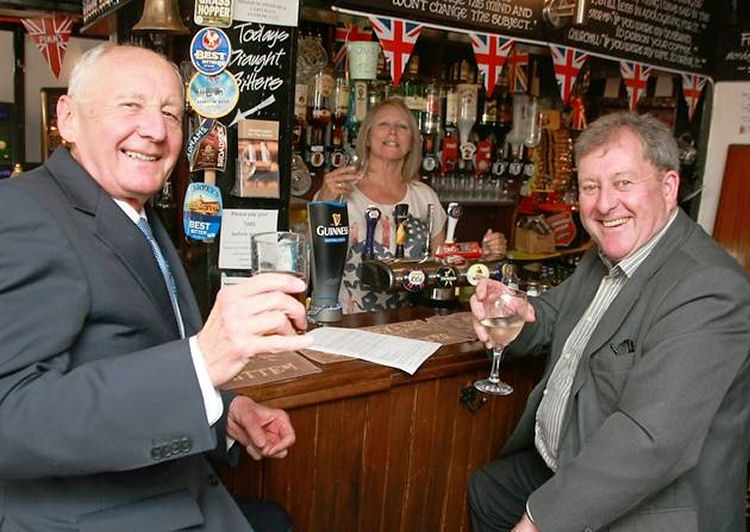
Left to right Len Winter, Anne Sadlier and Peter Slender.
Standing for more than 700 years in the heart of Westerham, a
little pub with a huge history has remained strong at a time where
pub closures have rocketed.
Believed to have been founded in a period where the Black Death was
ravaging Britain’s population, The Grasshopper on the Green has seen
31 monarchs and 74 Prime Ministers come and go.
Snuggly nestled between far newer buildings, its charming exterior
and smell of old-fashioned cooking continues to entice customers.
Landlady Anne Sadlier and her husband Neale have been in charge of
the pub, known locally as the little Grasshopper, and often serve
visitors from across the globe.
She said: “We do get a lot of foreigners coming here because they
will quite often visit Chartwell, where Winston Churchill lived, and
the nearby Hever Castle.
“Obviously, the pub is really old – the stonemasons came here and
built the pub so they had somewhere to live while building St Mary’s
Church.”
Drawing on its more recent history, the pub has dedicated one of its
three bars to Churchill, who lived less than a mile away.
The walls are covered with famous quotes and images of Churchill, a
one-time regular who is immortalised outside on the village green in
the form of a statue given to Westerham by Yugoslavia.
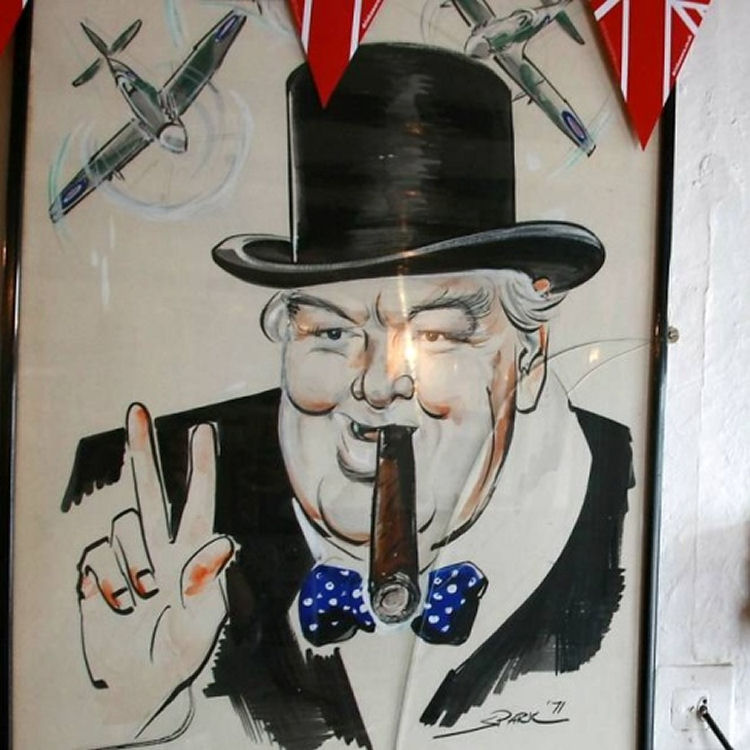
The history of the pub may feel like a weight on the shoulders of
some landlords but Anne says she and her staff are more than happy
to discuss its heritage and it can often add to the homely
atmosphere inside.
She added: “There’s not really any pressure, the place runs very
smoothly and it’s nice that the customers have the interest in our
history.
“They ask the staff about the historical stuff and it’s good for
banter. It’s great, but it’s not unique – the nation is full of pubs
with this much history.”
The inn derives its name from the crest of the Gresham family, whose
most famous member was Thomas Gresham – founder of the Royal
Exchange and adviser to King Henry VIII.
Playing its part in history, the former coaching station was run by
the Frith family – famous for John Frith, who in 1533 was burned at
the stake for heresy in London’s Smithfield.
Centuries old at the time of his death, the Grasshopper continued as
a boarding point for coaches travelling daily from Westerham to the
heart of Fleet Street.
Following in a long line of landlords, the Sadliers also live in the
grounds of the 14th century pub.
At the rear remains the stable block that would have once housed the
tired horses of heavy-eyed travellers in search of a meal and a bed.
Today, Anne and Neale sleep beneath the same roof as countless
trusty steeds as the stables have been converted into a modern
cottage.
Though the centuries have changed the landscape of Westerham, The
Grasshopper on the Green remains a constant that doesn’t show any
sign of fading.
Always adapting to more modern times, the pub could well host
visitors centuries from now pestering bar staff about the
absurdities of the 21st century.
|
|
From their website
http://www.grasshopperonthegreen.co.uk/aboutcontact.html
accessed 21 October 2018.
The History of Westerham & The Grasshopper on the Green.
The Grasshopper on the Green stands in the centre of Westerham
overlooking the green which was for many years the local market
place.
Please note that the pub is "on the Green" by the Churchill Statue -
not to be confused with the "Grasshopper Inn" outside of town.
The Inn derives its name from the heraldic crest of the Greshams, an
ancient family who had a country seat at Titsey, 2 miles outside
Westerham. One of the most famous members of this family was Thomas
Gresham, the Tudor merchant who founded the Royal Exchange and whose
brilliant advice to Henry VIII earned him a knighthood.
Henry VIII was a frequent visitor to these parts when courting Ann
Boleyn who lived at Hever Castle which is nearby to Westerham. The
town appears in the Doomsday survey of 1086 as Oistreham.
Its famous son's include John Frith the Protestant martyr who was
burnt at the stake in 1533. It is believed that Frith was the son of
former Landlord of the Grasshopper Inn, which even in that era was
already several centuries old.
Originally the Inn was built to accommodate the small army of Masons
who lived in Westerham during the construction of the Parish Church
which still bears the cross that was cut into its exterior masonry
over 700 years ago.
For many years the Grasshopper was a coaching station and it was the
boarding point for a coach service plied daily between Westerham and
Fleet Street. The next point being the "Bell" at Bromley.
From the windows of the restaurant the statue of General Wolfe can
be seen, a son of Westerham who died in his hour of Victory at
Quebec.
Westerham people recall how the uplifted sword of this great
soldiers statue used to point symbolically at the Battle of Britain
fighters as they flew nearby Biggin Hill to a victory even greater
than that of the young General himself when he fell, riddled by
French bullets on the Plains of Abraham. |
LICENSEE LIST
FRITH family 1533+
CHAPMAN John 1828-39+
 
BANTICK/BERWICK Sarah 1847-51+ (age 71 in 1851 ) )
BURBERRY Stephen 1853-Feb/60
JOHNSON Henry Feb/1860-71+
REYNOLDS W 1867+
MOORS Joseph Thomas 1874+
MARTIN Joseph 1881 (age 27 in 1881 ) )
 FRANCIS William Henry 1889-99+ (age 35 in 1891
FRANCIS William Henry 1889-99+ (age 35 in 1891 ) )
MURRAY John 1903+

COX James William 1913+
PALMER Joseph D 1918-22+
CHITTENDEN J W 1930+
READ William 1934+
BLUNDEN Arthur Walter 1938-Feb/50 dec'd (age 53 in 1939)
NEWMAN William 1950s
SADLIER Neale & Anne 1994-2018+
https://pubwiki.co.uk/Grasshopper.shtml
 From
the Pigot's Directory 1832-33-34 From
the Pigot's Directory 1832-33-34
 From the Kelly's Directory 1903 From the Kelly's Directory 1903
 Census Census
|










